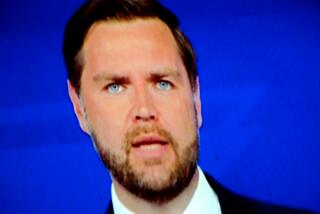Why, Indeed?
- Share via
The question was an obvious one: What would Sen. Dan Quayle do if something happened to the President and he suddenly found himself the chief executive of the United States? After all, the primary role of the vice president is to be able to assume the presidency.
Dan Quayle had weeks to prepare for that obvious question in Wednesday’s debate with Democrat Lloyd Bentsen, but he repeatedly failed to provide a satisfactory answer. Perhaps Quayle was over-programmed by his debate coaches, as was suggested by his fellow Republican senator, Alan Simpson of Wyoming. That might excuse Quayle’s stumbling over a query about some peripheral issue. But not about the central question of the contest for the vice presidency.
No one who is vice president, or a candidate for that office, would anticipate a tragedy that would thrust him into the Oval Office. But it happens. Fewer than 100 days into his presidency, Ronald Reagan narrowly escaped assassination. It would seem that anyone who is considered for the No. 2 office would have to ponder at some length the grim question of what he would have to do if he succeeded to the presidency.
There is considerable precedent for a vice presidential succession in recent times. Harry Truman not only assumed the presidency, but immediately faced one of the most awesome decisions of modern time, whether to use the atomic bomb. Lyndon B. Johnson drew on his Senate leadership experience to be an effective successor to John F. Kennedy. Gerald R. Ford employed his own congressional leadership skills to bring together a nation torn by constitutional crisis.
Consider all the obvious things that Dan Quayle could have said in response to the question of what he would do if thrust into the presidency--a question that had to be asked three times: consult with the leaders in Congress, summon the Joint Chiefs of Staff, demonstrate to leaders throughout the world that a smooth succession had taken place, reassure the American people. Instead, the junior senator from Indiana sought to establish his White House credentials by comparing his experience to John F. Kennedy. This, of course, prompted Bentsen’s scathingly obvious retort: “Senator, you’re no Jack Kennedy.” He is not.
More than once, George Bush has faced the prospect that he himself might be thrust instantly into the lonely position of world leadership. More than anyone, George Bush should understand the pressure and responsibility of being a heartbeat from the presidency. When he pulled Dan Quayle out of relative obscurity for the vice presidential nomination in August, the question was asked: Why Dan Quayle? After two months of intensive scrutiny of Quayle and his qualifications, the question persists. Why Dan Quayle?
More to Read
Get the L.A. Times Politics newsletter
Deeply reported insights into legislation, politics and policy from Sacramento, Washington and beyond. In your inbox twice per week.
You may occasionally receive promotional content from the Los Angeles Times.










